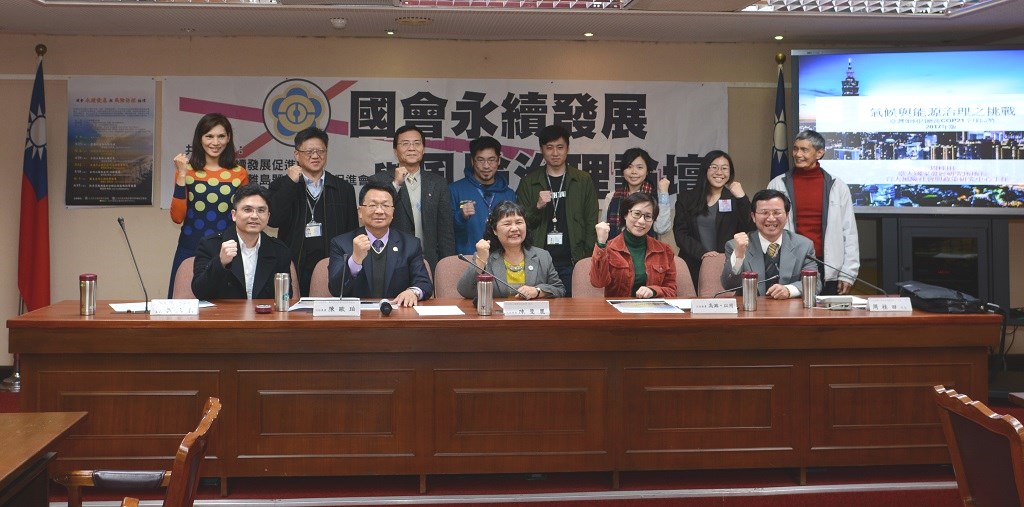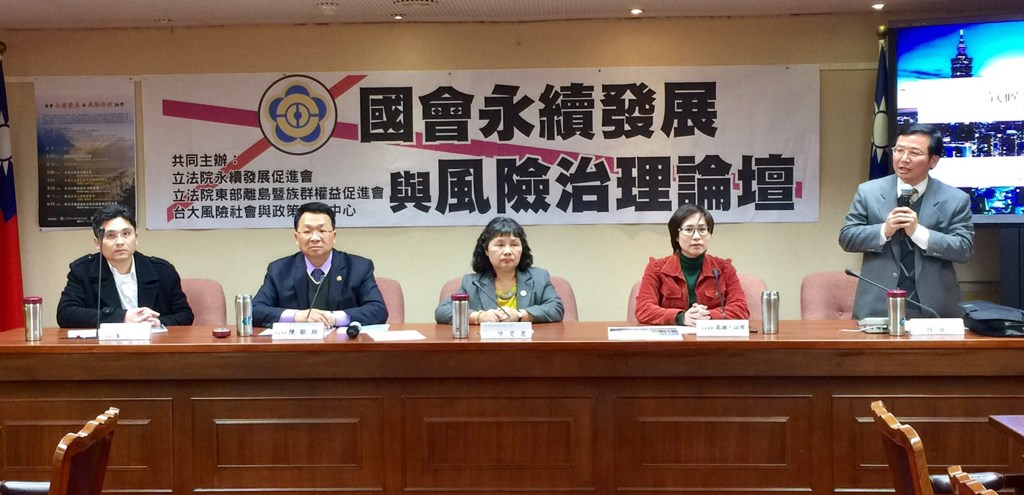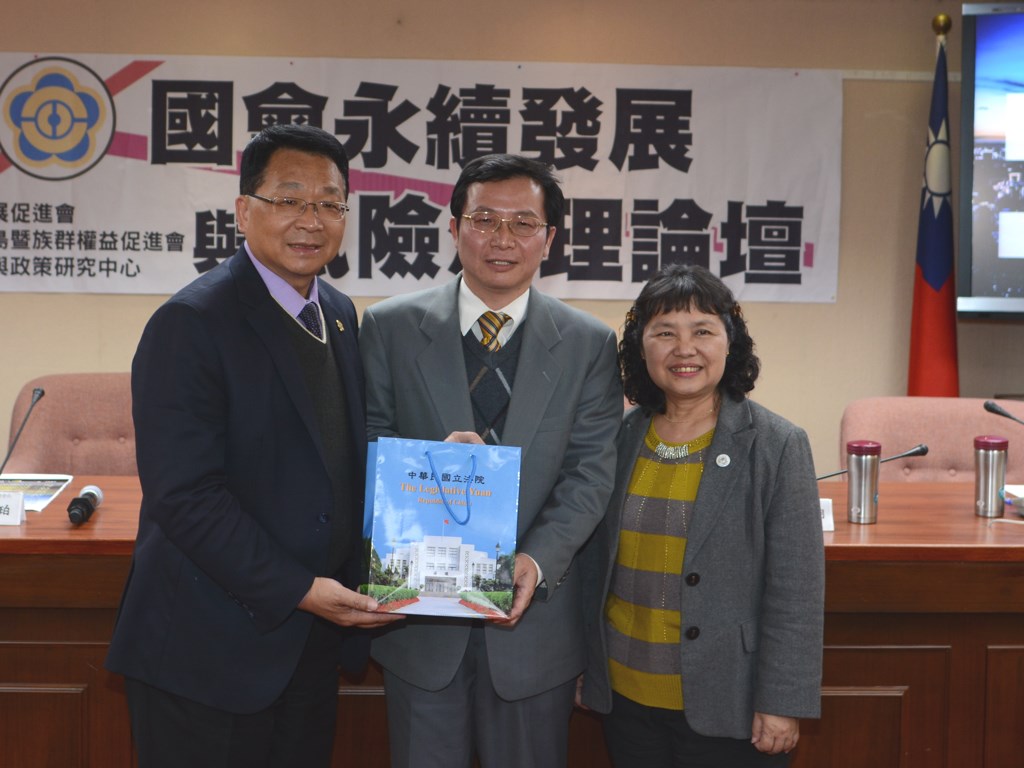Translator / Jo-Shih Chiu
In recent years, emerging issues such as dramatic climate change, global warming, epidemics, unexpected disasters, air pollution and PM2.5 are rapidly posing unpredictable challenges to the human society. The "Sustainable Development Promotion Council" and "Eastern Region, Offshore Islands and Ethnic Rights Promotion Council" of the Legislative Yuan and the RSPRC of National Taiwan University thus co-organized the "Legislative Forum on Sustainable Development and Risk Governance", in the hope of enhancing the in-depth dialogue between the legislature and the transforming society, and facilitating the communication among the government, regions, academics, and the public.
The first forum and press conference took place on 9 March 2017 at Legislative Yuan's Chun-Hsien Building in meeting room 802. The event began with the speeches of Legislator Chen Man-li (Chairman of the Sustainable Development Promotion Council), Legislator Chen Ou-po (Chairman of Eastern Region, Offshore Islands and Ethnic Rights Promotion Council) and Legislator Kawlo Iyun (Vice-chairman of the two promotion councils), followed by the lecture of Prof. Chou Kuei-Tien (Chairman of Graduate Institute of National Development and Chief Director of RSPRC, National Taiwan University) for the first forum.

Legislator Chen Man-li, who has been working in this field for a long time, pointed out that sustainable development is not as unreachable as one might imagine. The COP of the United Nations reviews the implementation aspect of each country on an annual basis, our government shall particularly pay attention on the importance of Paris Agreement proposed in COP21. Legislator Chen Ou-po mentioned the value of sustainable development – the unduly exploitation has led to significant impacts, causing the development imbalance of remote areas and widening the gap between rich and poor. Therefore, it is necessary to foster the sustainable development in the eastern region and offshore islands of Taiwan. Legislator Kawlo Iyun reminded us of the destruction made to our land by the Eight-Eight Flood. As we inevitably need to confront the extreme climate issues, she hoped that a better consensus among different sectors of the society would be reached through the forum.
Prof. Chow's lecture is titled "The Challenges of Climate and Energy Governance - How Does Taiwan Cope with Post-COP21 Global Situation". He first introduced the international context and pointed out that the Paris Agreement signed at the end of 2015 would contribute to the significant development trend in Taiwan, including the transition of internal industries and the society. However, we are not facing up to the climate change issues actively. Although climate change sounds far from us, the dramatic change is obvious to all, such as the acute change of temperature and the disrupted flowering period. There are four important factors regarding the improvement of climate change: adaptation, carbon reduction, finance and politic. The central elements for implementing the Paris Agreement are NDC (Nationally Determined Contributions) and DDPP (Deep Decarbonization Pathways Project). With regard to NDC, our carbon reduction goal is to reduce carbon use by 2030 to the base value formed in 2005, then further make a reduction by 20%; while for DDPP, plans have been developed based on the 2050 schedule.
One may find from Taiwan's economic and social development that Taiwan relies on petrochemical economy. The energy consumption of the Industrial sector has increased to 37% in 2015, and energy consumption is directly proportional to carbon emission. Therefore, our priority is to tackle the energy issues. It is suggested that we gradually implement the transition from coal and natural gas to renewable energy. As Industrial sector's carbon emission level, especially in the petrochemical industry, has an impact on national carbon emission, the transition of petrochemical industry is very important.
With regard to policy debate, law making and regulation regarding these issues shall not be delayed and inactive, because regulation drives innovation and pushes the industries to implement the manufacturing process of higher quality. At present, the petrochemical industries in China and Southeast Asia are more technically advanced than those in Taiwan, we shall foster innovation and development through proper regulation and increase our competitiveness, in the hope of establishing a new economic model. Performing energy-saving actions does not necessarily mean we are in a shortage of electricity, we need to address the issues by seeking energy efficiency and other measures. The government shall establish an explicit mechanism, verification methods and reduction strategies for carbon emission.

In terms of energy intensity, the petrochemical industry's energy intensity leads to higher energy intensity in Taiwan. This is not writing off the petrochemical industry, but a suggestion that the petrochemical industry shall advance and transit to make our country more competitive. Usually, an industry that is more energy-intensive would contribute more to the GDP, but this is not the case in Taiwan. The energy consumption of petrochemical industry has been increasing year by year from 1992 to 2014, but its contribution to the GDP remained unchanged. The petrochemical industry with high carbon emissions, high energy consumption and low added value would trap Taiwan in the difficulty of industrial structure transition, and be subject to international sanctions.
Subsequently, the legislative assistants and attendees raised questions in order. First, a legislative assistant asked that if regulation can really bring the upgrade of technology, or only passively control it? Prof. Chou pointed out that our current law is backward, for example, last January, a company outsourced its waste processing to a downstream supplier who then poured the waste into the river - this is not what competitive and major corporates should do, instead they should serve as pioneers of transition and communicate their concerns and recommendations to the government. Legislator Chen Man-li then asked that since the petrochemical industry's carbon emission has been increasing but not making more contribution, why is it still tolerated? Chairman Chou responded that because the major enterprises have strong economic influences that sabotage the progress of policy making and implementation. In foreign countries, the transparency of corporate financing and the public's monitoring will back up the government's policy promotion. Chairman Pan Han-shen also asked that when faced with doubts and questioning of monitoring and carbon reduction measures, how can we find a way out? According to Prof. Chou, legislative assistants should strengthen their knowledge, including scientific methods and data analysis. Thus, it is very important to have a solid background of general knowledge.
Besides, an attendee mentioned that the main goal of energy transition in Taiwan is to improve air pollution, can the measurements of PM2.5 conducted by the public using air box serve as scientific evidence? Prof. Chou responded that when air box becomes commonplace, the regulation will be from the bottom up and become a middle-class movement, then put more pressure on the government. As the industries' decision making and action have been slow, they should not be hostile to sustainability and environmental protection, but regard them as progress and development. Corporates with vision tend to consolidate the knowledge and techniques regarding economy, society, environment and technology, and invest more in think tank's research projects. Mr. Chen, a farmer from Changhua County, asked that is it possible for the government to make laws that encourage the major corporates to release resources? Prof. Chou responded that this is an issue that all governing parties will encounter, if there is growing voice in the legislature on this, the party in power will be pushed to move forward.
Executive Secretary Hsu Chu-Feng raised the question on how to regulate the roles played by corporate directors? Prof. Chou explained that the increasing social pressure will facilitate the development of transition. Although transition is a slow process, as our social energy is becoming stronger and stronger, an explosive paradigm shift will happen when the turning point comes. A legislative aide mentioned that the public has weak perception of risks, how to establish a system by which everyone can participate in the discussion? Prof. Chou pointed out that the public awareness of demanding paradigm shift has been increasing, but there may still be resistance when it comes to economic issues, it is thus required to develop a more explicit and proper plan and make sectional adjustment of the system. In the end, Legislator Chen Man-li made the conclusion for the forum, that we shall establish an academic platform which enables the communication and discussion between the administration and NGOs, and empowers them to make policy recommendations.



